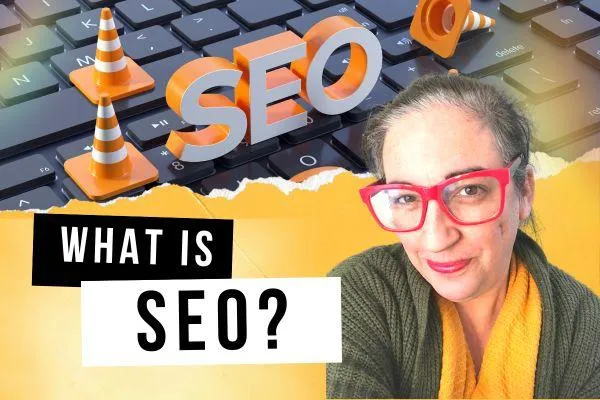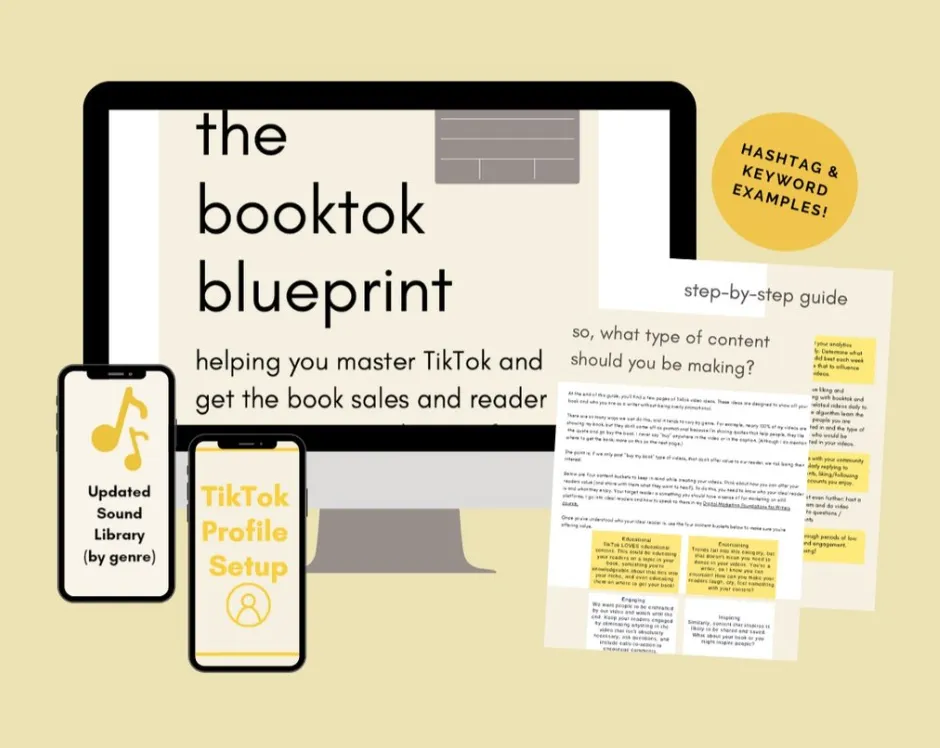
SEO: Keep It Simple While Still Getting Results
No doubt you've heard that SEO is super important for your online business...and it is. But the entire concept has become more and more complex over the years. (There is a reason for that, we'll get into it). First I want to reassure you that simple SEO can still get results in 2024 and with just five pieces of the puzzle you'll get most of the way to the results you want.
What Is SEO? Definition and Vocabulary
I see a lot of people asking questions online about SEO and many of thsoe questions immediately tell me that they don't know what it is. If you already understand the basics you can skip ahead. But if you just hear that accronym everywhere and have no idea what it's supposed to mean, this section is for you!
S.E.O. - SEO stands for Search Engine Optimization and it is the process used to make sure that when people search for the topic, service, or product you offer that they find you. It means making the content you produce for the web optimized to be found in search engines like Google or Bing.
Keyword - The keywords are what your ideal clients would be typing into a search engine when they are trying to find the solution that you offer. Think about what you want to be found for. If I have a pencil company, for example, I want my blog post to come up when someone searches "What pencil do teachers prefer?" or "What makes a pencil No. 2 and why does that matter?" but I don't need (or want) my post to come up if someone types "What's the best fabric to sew a prom dress?"
So my keywords might be No. 2 pencil, number 2 pencil, teachers, best pencil. After I've brainstormed some ideas I'll be doing keyword research (see next section).
Long Tail Keyword - Fifteen years ago you could be found pretty easily for a single word keyword. There was a lot less competition so you might show up with a keyword like "pencil." In 2024, one-word keywords are probably useless and throwing away your effort.
That's where long tail keywords come in. This means your keyword is a short phrase. There might be 12 million people searching for "pencil" but only 1 million searching "what is a number 2 pencil." And your keyword research can tell you if you have a chance of being seen on that long tail keyword presuming that the competition is less.
SERP - This is another acronym and it stands for Search Engine Results Page. So after someone types in and searches "What is a number 2 pencil?" they get a page of answers. You want yours to show up as close to the top as possible so they click on your site. That page of answers is the SERP for that long-tail keyword.

Ranking - Your ranking is where your piece of content/your website shows up on the SERP. Marketers have a joke that the best place to hide a dead body is on the second page of Google. If you aren't showing up on the first page, you aren't going to be seen. Think about your own habits. If you search something and you don't see your answer on the first page, do you click to the second or do you rephrase your search query? Most people do the latter.
Rankings can change quickly since many people are vying for that number one spot.
Black Hat - Remember I said we'd talk about why SEO has gotten so complicated? Part of it is there's more people with websites than ever but there's another reason. There are always unscrupulous people who will look for tricks and loopholes to cheat the system and get ahead. Google and other companies then come out with new rules to stop the underhanded people and those people start looking for new ways to exploit and get an advantage. It's a constant race.
Sneaky tricks in SEO are called "black hat" and techniques that are on the edge/somewhat questionable are called "gray hat" and proper SEO techniques are "white hat." Don't ask me why.
I'll give you an example. One day I was looking for how to do something on a website but it was a very obscure problem and tough to find results. I clicked on one page and read through the entire thing looking for my answer. It was never mentioned. I was mystified. Why did this post come up in my search? Eventually I realized that the question I asked was hidden on the page. At the end of every paragraph the author had written my query and then changed the text color to match the background so it was invisible. The search engine robots could see it but humans couldn't (I found it by highlighting the text).
So this person clearly knew that someone would ask this question but instead of giving an answer, he tricked the system, leaving me without an answer. You can see how this is a nasty way to use your SEO know-how.
Keyword Density - This refers to how often you repeat keywords. Way back in the first iterations of Google you would want to use your main keyword as much as possible. But that led to consumers not getting helpful results. Instead of a blog post about pencils the top result might be a page that just says "pencil" 500 times. So now keywords need to be sprinkled into the text in a natural way.
...many SEO professionals suggest that 1-2% is a reasonable target. This percentage means that you are including your target keyword around one to two times per every 100 words of content.
-Surfer SEO (this is giving them a backlink, see the last vocabulary word on this list)
Meta Data - This is the additional information you give your system about your piece of content. It isn't directly viewed by the consumer.

Domain Authority (DA) - This is the measure of how respected your website is. Sites with a proven track record over time will rank higher than newer sites that are untested. The two biggest factors in your DA are the age of your site and your backlinks, which we'll talk about in just a moment. This is one of the reasons why SEO takes time to work. When you have an active website that's been around a while, the search engines see you as a solid presence in your field. This is also why blogs are great for websites because you are putting fresh content on your site regularly and showing that you have an active site. (Plus the more posts, the more opportunity there is for you to be found through search traffic).
Backlinks - The more other sites that link back to your site the better. It tells search engines that other people in the field respect what you have to say and want to reference you. In SEO professionals there is a strong emphasis on getting backlinks and this is an area rife with abuse. I'll go over a few methods of getting backlinks but my method is to not worry about it much and let it happen naturally.
Income School on YouTube, one of my favorite resources for all things blogging, has great insight on this. They said the best way to get backlinks is to do original research that lazier bloggers will want to link to instead of doing their own research. Lazy might be too harsh a word. But the truth is plenty of bloggers will do their research by Googling the topic and reading the top few articles. If your article has unique data that isn't spread all over the place, it will make sense for them to link to your post instead of recreating the whole thing.
Popular methods of getting backlinks are:
Getting interviewed on podcasts and asking the host to put a link to your site in the shownotes (to learn more about how to get podcast interviews, I have a post on that here)
Signing up for HARO emails. This is a site that stands for Help A Reporter Out and it sends you a list daily of people looking for experts to interview or reference in articles. When you are referenced in an online article it would usually have a link back to you. (I gave up on HARO because there's a lot of requests and very few that ever pan out. For me it was a waste of time. Here is a helpful article about the pitfalls...speaking of backlinks!)
Referencing someone with high DA in your article then emailing them and asking them to link to it (the higher someone's DA, the more valuable their backlink is)
Which Sites Actually Use SEO?
The main sites where SEO matters are: Google, YouTube, & Pinterest. Basically any site that has a search bar or search function is using your SEO to give people what they are looking for. On fast moving social sites like Facebook, Instagram, or Tiktok, it matters far less. People may still sometimes search for things but you shouldn't put too much time and effort into SEO there.
If you are an author then you're doing SEO to your book pages to be found on Amazon and other book retailers. If you are an Etsy seller you're doing SEO to your listings to be found in the Etsy search.
Keyword Research: What Everyone Is Looking For
What every marketer is looking for when they do keyword research is a word or phrase that has high search volume, and low competition.
That means a lot of people searching for it but very few people providing it. These magical keywords are pretty hard to find these days but remember that "a lot of searches" is relative. Very niched businesses can see great success offering a product only 10 people a month search for if there's no one else offering it.
Whatever keyword research tool you use, it will tell you the monthly search volume of the word or phrase you put in and how much competition there is. It might also suggest related keywords and some color code their results to show where there are opportunities with less competition.

An example search in Publisher Rocket, a keyword research tool for Amazon authors (more on them in a moment!)
Keyword Research Tools
Tools like SemRush, Moz, and Ahrefs are very expensive and usually best for professional marketers who specialize in SEO.
For the average entrepreneur or small business owner, there are less robust tools that will serve just fine.
In fact for a general tool you can use the keyword planner within Google Ads without having to spend any money on ads.

Example of Google Keyword Planner Tool (Notice I don't even have an active account anymore)
For authors Publisher Rocket is the industry standard and it's just $99 for lifetime access, no monthly fees. This is where you can research the best categories for your books and the best phrases to put into the seven keyword slots.
For YouTubers VidIQ is an excellent tool with keyword research as well as title suggestions, competition analysis, and more.
For Etsy sellers there's Erank.

Example search in Erank
When it comes to blogging I recommend an unusal tool called RankIQ. It has a unique approach for how to get your blog posts optimized and it's easier than anything else I've ever seen. I have a video about using Rank IQ here:
The cost of most keyword research tools is hundreds of dollars a month but RankIQ has a $49/mo level and then a SECRET $29/mo level. It turns out when you sign up for the $49 a month level, you can click upgrade and actually downgrade to $29/mo, which gives you 8 reports per month.
The Only Five Pieces Of SEO You Should Worry About
Throw away the 102 point checklist on SEO you downloaded. Yes, there are many factors that go into how search engines decide to rank you and even professionals don't know what all of them are, but if you are looking to get some free traffic to your website, stick with these simple SEO elements first:
Title
Description
Alt Text
Tags
Headings
Not every platform will have all of these things. If you are posting a YouTube video you won't have headings to worry about, for example.
These are the five main places you'll be putting those keywords you found.
The Title - Of course you want your main/best keyword in the title of your blog post, youtube video, shop listing, or Pinterest pin. A lot of tools will recommend the keyword be at the front of the title but readability is more important. Write your title for humans first, robots second!
A tool I use all the time for improving my titles is Headliner Studio from CoSchedule.
Description - If there's anywhere to put a description, sprinkle it with more keywords as well as your main one. For a blog this will probably be in the meta data section where you put the sentences that will show on the SERP.
Alt Text - This is the text that describes images on your page. The purpose of Alt Text is for people with visual impairements to know what your images are. So it is very important that you prioritize being accurate and descriptive with your alt text knowing a screen reader will read it outloud to someone. It is not primarily for SEO but it is a key place to put keywords too.
For example, I might have an image that is described in Alt Text as: Ayoung white woman wearing a blue dress sits at a library table.
But I can add in some keywords like this: A young white teacher wearing a blue dress sits at a library table tapping a number 2 pencil.
Tags - Not every place you're creating content will have a place for tags but if there is put your keywords in there. Tags are not the most important thing but if there's a space for them you should use it.
Headings - In a blog post it's important to format your writing with headings. H1 heading is for the title and you should use H2 headings throughout. Make sure to use keywords in those headings too. This tells the search engine a lot about what your topic is and what phrases are important.
These five areas are going to get you perfectly servicable results. I recommend remembering the 80/20 rule and not obsessing over getting every detail of SEO into your content. The payoff in terms of your time is probably not going to be worth it.
But if you've got the time, here are a few more places where a little SEO can go a long way:
File Title - It's subtle but it's another place where you can have some meta data working for you. When you are uploading a file such as an image for your blog or the footage for your YouTube video, first name the file something that has keywords in it. Instead of uploading Untitled97.jpg, upload Number2PencilsAtSchool.jpg. Users won't see the file name but the robots will.
Anchor Text - When you're adding a link to your content, it's great to use anchor text if you can. That's when you highlight a relevant phrase and make the words the link. In other words instead of: Read more about book marketing at www.financiallyfreeauthor.com/launchresources make it: Read more about book marketing.
Length - Finally, one of the ways a search engine assess quality is with the length. Especially with blog posts, having a similar post as a competitor but more words will probably win out. It's recommended to write at least 600 words (250 words is considered a standard printed page) but honestly over 1,000 is better! This post for context is 2,196 words.
Can [Insert Software] Do SEO?
Can Kajabi do SEO? Can Karta do SEO? Do you have to have Wordpress to get SEO? Can Go High Level do SEO? Can Squarespace do SEO?
Yes. Yes. No. Yes. Yes.
SEO is not about the platform, it's about how you put in your content. So just look for where you can add your meta data and use your keywords in your content.
When Will I See SEO Results?
It takes time. You plant your SEO seeds and then you wait for them to sprout, grow, and finally flower.
You can monitor and check your progress with Google Analytics or any built-in analytics on a site like Etsy or YouTube.
I find it takes a minimum of six months before you see results from your SEO efforts but once it starts the impact compounds and grows expontentially.
So keep making content and promote it in other ways until the SEO kicks in. (Checkout my new book for more traffic ideas!)
Keep your site fresh and prove to the search engines that you are here to stay and you are a resource they can recommend to searchers.



